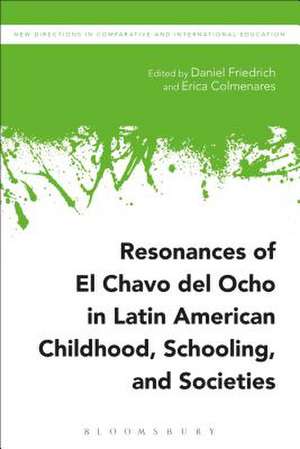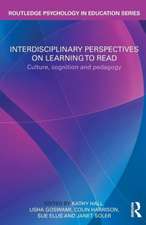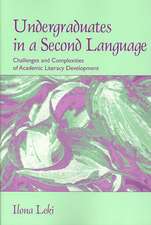Resonances of El Chavo del Ocho in Latin American Childhood, Schooling, and Societies: New Directions in Comparative and International Education
Editat de Daniel Friedrich, Dr Erica Colmenaresen Limba Engleză Paperback – 23 ian 2019
| Toate formatele și edițiile | Preț | Express |
|---|---|---|
| Paperback (1) | 229.86 lei 6-8 săpt. | |
| Bloomsbury Publishing – 23 ian 2019 | 229.86 lei 6-8 săpt. | |
| Hardback (1) | 714.44 lei 6-8 săpt. | |
| Bloomsbury Publishing – 12 iul 2017 | 714.44 lei 6-8 săpt. |
Preț: 229.86 lei
Preț vechi: 296.60 lei
-23% Nou
Puncte Express: 345
Preț estimativ în valută:
43.99€ • 45.58$ • 36.71£
43.99€ • 45.58$ • 36.71£
Carte tipărită la comandă
Livrare economică 21 martie-04 aprilie
Preluare comenzi: 021 569.72.76
Specificații
ISBN-13: 9781350097629
ISBN-10: 1350097624
Pagini: 208
Dimensiuni: 156 x 234 mm
Greutate: 0.3 kg
Editura: Bloomsbury Publishing
Colecția Bloomsbury Academic
Seria New Directions in Comparative and International Education
Locul publicării:London, United Kingdom
ISBN-10: 1350097624
Pagini: 208
Dimensiuni: 156 x 234 mm
Greutate: 0.3 kg
Editura: Bloomsbury Publishing
Colecția Bloomsbury Academic
Seria New Directions in Comparative and International Education
Locul publicării:London, United Kingdom
Caracteristici
Its interdisciplinary approach makes it a valuable addition to a number of fields, including international education, childhood and youth studies, and cultural studies
Notă biografică
Daniel Friedrich is Associate Professor of Curriculum at Teachers College, Columbia University, USA. He is the author of Democratic Education as a Curricular Problem (2014) and co-editor of a special issue of Education Policy Analysis Archives on the global network Teach For All (with Rolf Straubhaar). Erica Colmenares is a doctoral researcher in the department of Curriculum and Teaching at Teachers College, Columbia University, USA.
Cuprins
Introduction, Daniel Friedrich (Teachers College, Columbia University, USA) and Erica Colmenares (Teachers College, Columbia University, USA) Part I: El Chavo Encounters Latin American Education and Childhoods1. Schooling, pedagogical imaginaries, and Latin American childhoods in El Chavo del 8, Nicolas Arata (University of Buenos Aires, Argentina) and Daniel Friedrich (Teachers College, Columbia University, USA)2. Conceptions of Childhood in the Vecindad, Victoria Parra-Moreno (Teachers College, Columbia University, USA)3."Here comes Chavo! Everyone's watching the TV". Thinking about difference and alterity, childhood and education, Ana Paula Marques de Carvalho and Rita Frangella (University of the State of Rio de Janeiro, Brazil) Part II: El Chavo's Encounters With Other Latin American Societies and Cultural Artifacts4. From the Picaresque Novel to El Chavo del 8, Carlos Aguasaco (City College of New York, USA)5. Border-crossing Chespirito: El Chavo del 8 Meets Pepito in Exile, Limarys Caraballo (Queens College of the City University of New York, USA)6. El Chavo del Ocho as "Intimate Publics" in Venezuela: What happened to the Good Life?, Erica Colmenares (Teachers College, Columbia University, USA)Part III: El Chavo's Media-ted Encounters7. Figures of Mexican State, Society and Subject in Chespirito's TV, Ernesto Treviño Ronzón (University of Veracruz, Mexico)8. Media Education 'Sin Querer Queriendo', Dulce María Cabrera (Autonomous University of Chiapas, Mexico) and José Carbajal (Ministry of Public Education, Mexico Coda: El Chavo del 8's Connections and Reverberations, Erica Colmenares (Teachers College, Columbia University, USA) and Daniel Friedrich (Teachers College, Columbia University, USA)Index
Recenzii
Resonances of El Chavo del Ocho in Latin American Childhood, Schooling, and Societies presents theoretically kaleidoscopic views on notions of childhood and schooling from brilliant scholars working across the Americas. The book will undoubtedly appeal to those working in childhood studies, cultural studies, curriculum studies, international education, and media studies.
An eye-opening examination of a 1970s Mexican sitcom about the tribulations of an orphan boy and his friends in a low-income housing complex that became the most-watched TV series in Latin America and a shared reference for several generations. The editors' rhizomatic perspective gives the volume a level of intellectual coherence rare in edited books and a limpid analytical framework to explore themes of childhood (complicated by the fact that children were played by adults in the series), schooling, media, social class, Latin American-ness, and transnationalism. The clarity and richness of the analysis makes this a model for multidisciplinary cultural studies in general.
An eye-opening examination of a 1970s Mexican sitcom about the tribulations of an orphan boy and his friends in a low-income housing complex that became the most-watched TV series in Latin America and a shared reference for several generations. The editors' rhizomatic perspective gives the volume a level of intellectual coherence rare in edited books and a limpid analytical framework to explore themes of childhood (complicated by the fact that children were played by adults in the series), schooling, media, social class, Latin American-ness, and transnationalism. The clarity and richness of the analysis makes this a model for multidisciplinary cultural studies in general.














